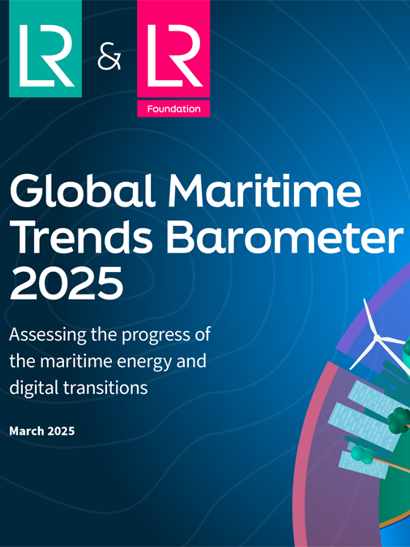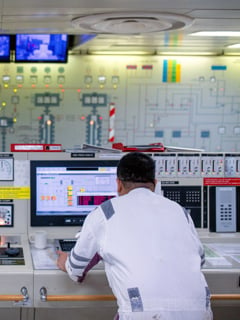MEPC 83 has given increased clarity to maritime’s decarbonisation imperative and the tools at hand to deliver it. But in practice, while regulations, targets and technology advance, progress remains more uneven than the projections suggest – and the risk of falling short grows.
That’s why benchmarking matters.
Earlier this year, LR introduced the Global Maritime Trends Barometer – a new tool designed to give an annual snapshot of the maritime industry as it makes both decarbonisation and digital transitions.
The Barometer gives evidence-based insights to enable strategic action. It measures progress in five critical maritime dimensions: energy, vessels, ports, maritime trade, and people. Progress against each is measured against a net-zero trajectory, with findings grounded in market data and expert analysis.
Results give a clear view of overall progress, where alignment is strong, and where gaps remain.
Energy transition scores ranged from just 24% to 30% alignment with 2030 decarbonisation targets. Despite the orderbook for alternative-fuelled ships growing by over 50% in 2024, the 2025 Barometer revealed that global energy production remains heavily reliant on fossil fuels. Vessels and ports show signs of movement but remain short of net-zero targets.
The ‘People’ category received the lowest combined scores across both transitions, showing widespread underinvestment in workforce development and training.
More than abstract data points, these figures show real misalignments between ambition and action that must be addressed.

"The industry is rightly focused on fuels, vessels, infrastructure and digital tools – but none of it works without people who are trained, supported and ready to lead the transition. This will be especially critical as alternative fuels become operational and digital systems are embedded into day-to-day operations. Through our strategic acquisitions of OneOcean and OTG, LR is uniquely positioned to support the industry in aligning digitalisation and decarbonisation with workforce readiness."

Strategic benchmarking
The Barometer doesn’t just inform – it enables action through a shared frame of reference, helping maritime organisations benchmark their own transition strategies, identify priorities, and monitor year-on-year progress.
LR’s Digital Maturity Index (DMI), launched in October last year, also forms parts of the Barometer. A self-assessment tool, it helps shipping companies rate their digital readiness and includes insights into operational technology use cases, from bunker optimisation to predictive maintenance. The DMI gives organisations an accessible starting point for advancing their digital capabilities.
Together, these tools help with data-led decision-making – essential as regulatory pressure increases and the cost of delays continues to grow.
The Barometer shows that the maritime industry remains in a “delayed transition” scenario – without faster, more coordinated action, the industry risks falling significantly short of its 2050 targets.
"This is a critical moment for the maritime sector. To reach net-zero by 2050 and remain commercially viable, the industry must stop waiting for certainty and start acting with strategic foresight. Other sectors, like finance, have long used scenario planning to navigate complexity – shipping has lagged behind. Now, with our expanded LR Advisory team and insights from the Global Maritime Trends Barometer, we’re enabling the industry to plan more effectively, adapt faster, and move forward with confidence."
But the picture is not without optimism. April’s MEPC 83 marked a positive step with the agreement of the IMO Net Zero Framework – the impact of which will be tracked in the next iteration of the Barometer. Digital innovation continues to proliferate throughout the sector. Momentum around alternative fuels builds. Tools like the Barometer support shipowners and operators in making decisions and measuring their progress.
Energy and digital transitions are complex, spanning multiple decades in scope. But progress can and should be measured. With the right data, targets are achievable. It’s vital that benchmarking becomes part of the operational mindset, built into strategic planning, investment decisions, and policy development, so that the decarbonisation projections that look good on paper are more closely replicated in the real world.




